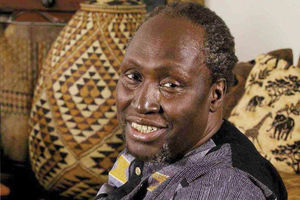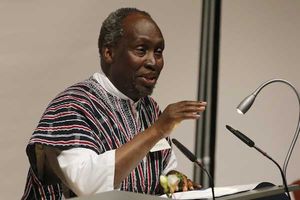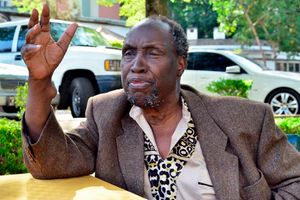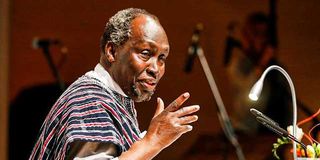
Celebrated Kenyan author and scholar Prof Ngugi wa Thiong’o.
Do not expect a formal burial ceremony for celebrated author Ngugi wa Thiong’o, as he had wished to have a private exit from the world.
His family, in a statement issued on June 1, wrote that “it was his personal request not to have a formal interment” and that “he wished instead to be remembered in spirit, through the ideals he stood for and the lives he touched”.
As such, the first event to be held in Kenya in honour of Prof Ngugi’s life will be on June 20, as his family announced on Thursday, at the University of Nairobi’s Taifa Hall.
It will be held from 9am to 5pm and its poster was posted on Facebook by the family’s spokesman, Nducu wa Nguci and also by Wanjiku wa Ngugi, who first announced the titan’s death.
This is even as Prof Mukoma wa Ngugi, one of the literary titan’s 10 children, but who has been excluded from the burial plans, revealed that the body had already been cremated in the US.
Also Read: Ngugi wa Thiong’o: Life and Times
In a wide-ranging interview, Prof Mukoma, a professor at Cornell University, said the cremation was part of Prof Ngugi’s wishes.
“So, he’s been cremated, but to be clear, that was his wish,” he said. “I know it’s against our Kenyan culture and so on and so forth, but at the same time, to me, it makes sense.”
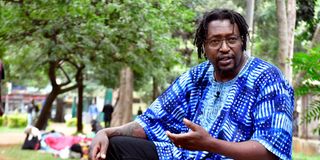
Prof Mukoma wa Ngugi, son of the late author Ngugi wa Thiongo during the interview when he spoke about his late father on June 05, 2025.
He noted that Prof Micere Mugo, who co-authored the famous play “The Trial of Dedan Kimathi” with Prof Ngugi and was also based in the US at the time of her death, was also cremated.
“I think, if I die, why would I want my body [carried] with the luggage?” posed Prof Mukoma. “So, that was his wish, and I think that one we should honour and respect. And I have to say that it was very brave of him, and also forward-thinking.”
Cut off
The interview with Prof Mukoma also brought up the fact that he was cut off from the Prof Ngugi family after he revealed on social media that Prof Ngugi used to batter his mother, the late Nyambura wa Ngugi.
“I’m sorry that we didn’t talk for the last three or four years. But I told my truth, and I think that’s fine enough,” said Prof Mukoma.
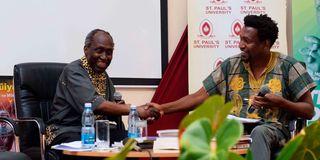
Ngugi wa Thiong'o and his son Mukoma wa Ngugi.
Prof Mukoma flew to Kenya earlier this week to take part in some literary engagements that include a literary prize for Kiswahili writing.
He confessed that he was kept in the dark regarding Prof Ngugi’s final days, and that had he not been informed by one of his brothers, he would have learnt of the death online like the rest of the world.
“I would have known he’s dying through social media except for one brother who told me, ‘Hey, things are getting really bad now,’” he said.
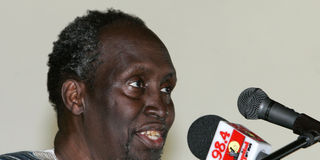
Kenyan author Ngugi Wa Thiong'o speaks during the launch of his new book "Wizard of the Crow" at the University of Nairobi January 15, 2007.
He also wondered why the larger Ngugi family was kept in the dark regarding the cremation, which he said had started “a family feud”.
“I don’t know why they’re doing this stuff. I don’t know why they can’t think of even letting the larger Thiong’o family know,” he noted.
We put that claim to the family’s spokesman via WhatsApp, though he did not immediately reply.
“I’m estranged, let’s put it that way, because I spoke about my mother,” said Prof Mukoma. “I can’t lie and say we spent the last few months together laughing and blah, blah, blah. No, it was full of tension and our family was divided.”
Honouring Ngugi
The family’s June 1 statement indicated that the first function in honour of Prof Ngugi will be held at the Akazi Gallery in Atlanta, the city where the author died.
A poster shared on Facebook by Wanjiku indicated that the event will happen this Saturday from 3pm, and that the gallery is “just steps away” from the Martin Luther King Jr Centre.
It added that the event will be streamed on YouTube on the Ngugi wa Thiong’o Foundation page.
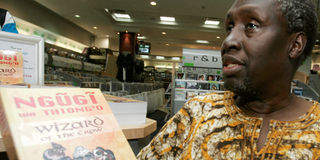
Kenyan author Ngugi Wa Thiong'o shows his newly launched book "Wizard of the Crow" during an interview with Reuters at a bookshop in downtown Nairobi January 16, 2007.
Speaking of the foundation, the family wants those who wish to register their support for Prof Ngugi to do so through his foundation.
“For those who have asked how you might support his passion for African languages and the power of translation to help languages and cultures speak to one another, please visit his foundation website,” said the June 1 statement.
Prof Mukoma, when asked about his father switching to Gikuyu as his primary language of expression, said there was a clear shift in ideology that came with it.
“When he was writing in English, he was applauded. When he started writing in Gikuyu, his language, that’s when the government now said, ‘Hey, this is becoming too radical.’ But his reasoning was very simple: ‘Why am I writing about workers, the exploited, the forgotten, the betrayal of freedom, the betrayal of independence in a language that the people I’m writing for don’t understand?’” he posed.
Prof Mukoma, 54, thinks there is a lot of “decolonising” needed for the minds of African leaders.
“We have a problem here amongst ourselves in terms of our politicians and where we put our energies in,” he said. “Like when Queen Elizabeth died, why would African leaders first declare mourning for, I don’t know, three or four days, public mourning? But more than that, when they get to London, they take a bus, all of them put in a bus to do that. So, I would say the work of decolonising the mind is not complete.”
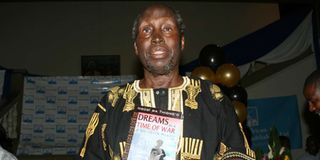
Prof Ngugi wa Thiong'o holds a copy of his autobiography titled Dreams in a Time of War. It was launched in Nairobi on August 19, 2010.
Asked if he had forgiven his father for physically abusing his mother, he recalled his days in the village when evenings would be punctuated by cries of women screaming due to beatings from their homes.
“Most Kenyan men and African men were like, ‘Oh, it’s African culture. You know, it was a long time ago; this is what we do, and so on and so forth.’ But most women were very supportive,” he said. “I don’t think we should couch that or colour it under the questions of say, it’s African culture, or this is how they were, or those were the times and so on and so forth. Now, I cannot say for sure I’ve forgiven him, but does it matter now, though?”
Asked whether he will miss his father, his reply was: “I’ll miss him very much, yeah. And I want to be clear, I love him. I love him with all his contradictions. In the same way, I’m sure my daughter at some point will have her own stories, but she loves me with my own contradictions, as do many other people and so on and so forth. But we should be allowed to call out those contradictions because it’s a question of making families healthier, but also our countries healthier.”
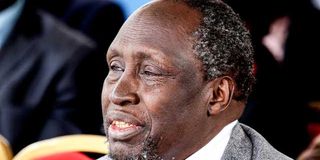
Renowned literature scholar Ngugi wa Thiong’o when he visited Eastleigh Boys High School on June 10, 2015, to celebrate 50 years of his book ‘Weep Not Child’.
Prof Mukoma would want the world to remember Prof Ngugi as a “loving but flawed father”, a man he typically called “fafa”.
“One of my happiest moments with him was a few years ago when we did an event together at St. Paul’s University in Limuru. It was beautiful because, first, for him to be able to come back to Kenya, but for us to do an event in Limuru, where we grew up, right? It was just beautiful. But I’ll say, even with intention, before we stopped talking, there was still humour. And I do believe there was still love anyway. It’s just that we took different paths,” said Prof Mukoma.
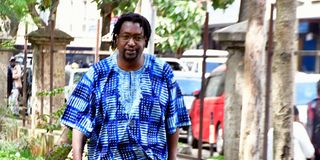
Prof Mukoma wa Ngugi, son of the late author Ngugi wa Thiongo during the interview when he spoke about his late father on June 05, 2025.
He also had warm memories of his mother, who died in 1996, the fondest being the fact that she warned them against disowning their father. Even when he was in exile, and despite the fact that the government had blocked the flow of royalties, she asked them to stay loyal.
“So, my mother called us for a family meeting and she said the last thing she wants to hear from us is that we are disowning our father. And that’s how I remember her. In spite of all her struggles, she did say that we should stand with our father,” he said.

